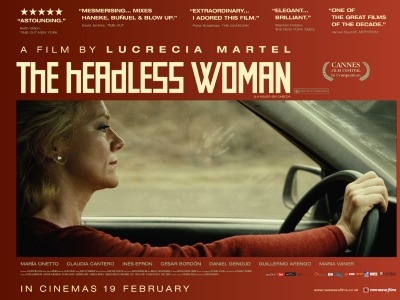
Aka La mujer sin cabeza
2008
Argentina | France | Italy | Spain
Director: Lucrecia Martel
Story & screenplay: Lucrecia Martel
Cinematogrpahy: Bárbara Álvarez
Editor: Miguel Schverdfinger
Art director: Maria Eugenia Sueiro
Cast: María Onetto (Verónica), Claudia Cantero (Josefina), César Bordón (Marcos), Daniel Genoud (Juan Manuel), Guillermo Arengo (Marcelo), Inés Efron (Candita), María Vaner (Tía Lala), Alicia Muxo), Pía Uribelarrea
If you’re under the misapprehension that Argentina is a place of Latin style and sophistication, then The Headless Woman should act as a suitable antidote. This is a film populated by some of the most unappealing costumes and styles imaginable: bad hair (including the protagonists bleach bouffant, which recalls the similar coiffure sported by that celebrated fashion icon, Madge Bishop from Neighbours); terrible clothes (pink velour tracksuits, anyone) and horrible interiors. The women all look either like escapees from the armpits of the 80s, the men like Diego Maradona in one of his ropier periods. There’s nary a pencil moustache or smart suit in sight.
The plot is simple enough: while driving along a country road beside a canal, the resolutely middle class Verónica loses concentration while answering her mobile and hits… someone, or something, she’s not sure what. Rather than stopping to investigate, she keeps on driving and descends into a state resembling post-traumatic shock. She hides out in a hotel, bumps into one of her many cousins and shags him, and eventually returns home in a somnambulant state. When she finally confesses what has happened to her husband, he doesn’t believe her, and when they return to the scene of the accident there’s no sign of a body. But could it be that the corpse – human or otherwise – has been washed away in the violent storms that have occurred in the meantime.
An international co-production with backing from Spain, Italy and France as well as Argentina, not to mention input from the celebrated likes of Pedro Almódovar and Tilde Corsi, this was a high profile release directed by arthouse darling Lucrecia Martel, whose previous films, The Swamp (2001) and Holy Girl (2004) were held up as part of the renaissance in Latin American cinema during the early part of the decade. Unsurprisingly, it was received with almost uniform adulation, picking up numerous awards and comments like ‘Disturbing and deeply mysterious, this tale of ghosts and guilt is nothing short of a masterpiece’ (Peter Bradshaw in The Guardian) and ‘You’d have to be headless or heartless yourself not to let this extraordinary, eerie film get under your skin.’ (Jonathan Romney in the Independent). In which case, I have to confess to being both headless and heartless because, although I’m in no doubt as to the artistry with which it is made, the film itself left me cold.
Perhaps it’s down to the fact that all of the characters are so unappealing: Veronica is a dullard, her family irritating, her husband almost as narcoleptic as she is. Frankly, considering she’s killed someone she deserves everything that’s coming to her, and I can’t think of anything more repellant than not stopping your car and checking it out if there’s even the chance that you’ve hit someone. Perhaps it’s the fact that everything is so art-house standard obtuse: did she hit someone or not? Is she having a breakdown? What’s the story with her creepy niece who seems to have lesbian designs on her? Who knows and, quite frankly, who cares. The trouble is that all of this obfuscation has become so predictable; Michael Haneke can get away with it because his films are interesting enough to sustain the ambiguity, but this isn’t. And, please, please… can filmmakers stop with the annoying ‘let’s end with a scene cut off in the middle and absolutely nothing resolved’ type endings; they’re as much a stylistic trait of arthouse films nowadays as the ‘priest revealed as the killer’ in giallo movies, and just as much a product of lazy writing.
Most unforgivably, even though it’s a scanty 87 minutes long, The Headless Woman still manages to be really boring. I’m not averse to deliberate pacing, and a lot of my favourite films of recent times The White Ribbon, Dogtooth, Katalin Varga – have been, well, slow. But, despite the fact that some people have painted this as a kind of Hitchcockian thriller or ghost story, this is both slow and dull. I’m with Philip French of the Guardian, who was of the opinion that: ‘… it’s an intriguing film, more alienating than involving, that ends abruptly and in my view unsatisfactorily. Some people whose opinion I respect regard it as a masterpiece, but after a single viewing I can’t share this view.’